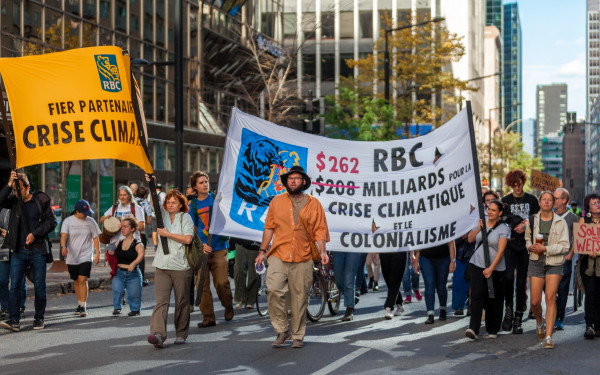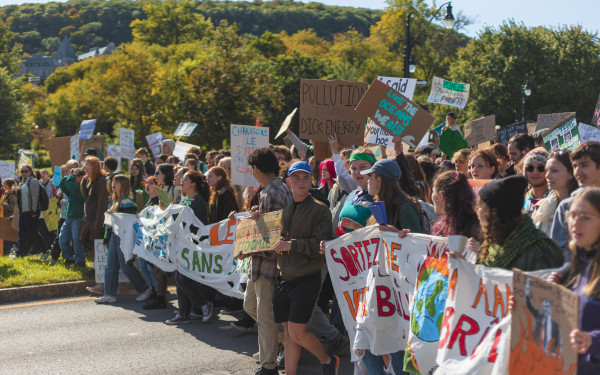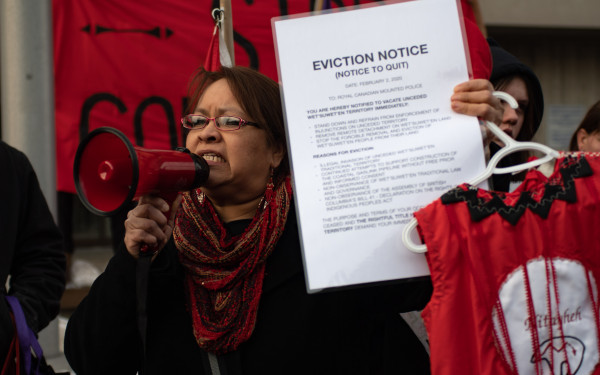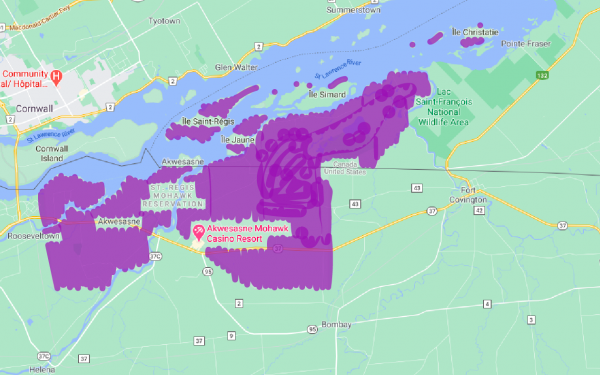Concordia University: Champion of Greenwashing
University’s Partnership with RBC Criticized by Student Climate Protesters
On Oct. 21, over a dozen protesters gathered outside the Guy-Concordia metro station, in front of a Royal Bank of Canada branch.
Climate Justice Action Concordia organized a peaceful event, denouncing their university’s role in the climate crisis.
Protesters held anti-RBC signs, handed out flyers to passersby and discussed the bank’s involvement in the fossil fuel industry.
“Today, we are here as students of Concordia as part of RBC Off Campus Week, which is happening all across Canada,” said protest organizer Mac Findlay. “Students are calling for RBC to leave campuses because they are the biggest fossil fuel funders of all banks in Canada and they are jeopardizing our future.”
RBC On Campus is an initiative to teach students about financing. Various universities across Canada are affiliated with the bank and offer students access to “student-focused financial advisors.” The initiative is a part of its RBC Future Launch project, which is committed to donating $500 million over ten years to help youth enter the workforce.
While the project’s initiatives in 2021 included donating three scholarships to "Indigenous, Black and all youth," its actions demonstrate an ironic lack of consideration for youth and minorities.
In the last fiscal year alone, RBC invested $208 billion in the fossil fuel industry, including financing part of the Coastal GasLink pipeline. “We are looking to engage with students on the role [of] the top five big banks in Canada—TD, BMO, CIBC, Scotiabank and RBC—are playing in the fossil fuel divestments,” Findlay explained.
“They are beginning to drill on [Indigenous] land, which is something that [the community has] actively been resisting for years now.” — Mac Findlay
Since its early stages, the pipeline project has been heavily criticized. Despite its proponents claiming that Coastal GasLink gave significant consideration to the surrounding Indigenous communities whose lands the pipeline would cross, as well as the project’s environmental impacts, activists have consistently opposed its construction.
The 670-kilometre pipeline will run through a number of environmental habitats, severely affecting ecosystems and potentially polluting waterways. Moreover, the project runs through Wet’suwet’en territory. RBC is “jeopardizing the future of Indigenous peoples by supporting fossil fuels and […] disrespecting Indigenous sovereignty,” Findlay said.
Findlay also stressed the urgency of spreading awareness now more than ever. “They are beginning to drill on [Indigenous] land, which is something that [the community has] actively been resisting for years now,” he said. Drilling officially began in September and is expected to finish by the end of the year.
During the protest, CJAC members forced RBC employees and clients to face their banners upon walking in the bank. “All we are trying to do is raise awareness and there’s not really much we can do until we are on the inside, and until many people start having a problem with how RBC is investing its money and what they are funding,” said Allegra, another protest organizer who did not wish to disclose their last name.
Allegra discussed how notorious RBC is for greenwashing. In its 2020-2021 annual report, the big bank made several commitments to sustainability and Indigenous rights, including decreasing its emissions, becoming a leader in sustainability and consulting “technology experts and Indigenous leadership.”
“It is really easy to say one thing and do another […], you can kind of get away with it […] if people aren’t informed about it,” Allegra explained.
CJAC is also urging Concordia to act by cutting ties with RBC in solidarity with climate justice and the Indigenous community. “We are studying under an institution that is funding all these terrible things […] like climate chaos and violence against Indigenous peoples,” said protester Mia Kennedy.
Concordia’s Climate Action Plan, drafted in 2018-2019, pledged to go carbon-neutral by 2024, including reducing the CO2 “emissions from indirect sources.” And yet, the funding for RBC continues, Kennedy said.
“[Concordia’s] branding is being clashed with the truth behind the institutions, with the money that we are paying them,” Kennedy said. ”This is our money.”
This article originally appeared in Volume 43, Issue 5, published October 25, 2022.

_900_600_90.jpg)





